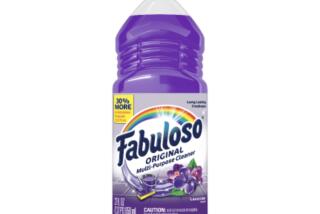Bristol-Myers to Remove All Shelf Capsules
- Share via
WASHINGTON — The maker of Extra-Strength Excedrin announced Friday it is withdrawing all its over-the-counter medications in capsule form as a result of the deaths of two Seattle-area residents who apparently took cyanide-tainted capsules.
The announcement came as Food and Drug Administration officials in Seattle expanded their search for poisoned medication after finding a fourth bottle of suspicious Excedrin and medical examiners re-examined several recent deaths in the area for evidence of cyanide poisoning. By late Friday night, however, no new deaths were attributed to cyanide poisoning.
Bristol-Myers Co., one of the nation’s largest pharmaceutical manufacturers, said it will stop making capsules for Datril, Comtrex and Bufferin, following the lead of Johnson & Johnson, which pulled its capsule medications off the market last February as a result of tampering with its Tylenol brand.
“What we’re doing immediately is withdrawing them all from sale,” said Harry Levine, vice president for corporate communications at Bristol-Myers. The company had already taken Excedrin capsules off the market.
Bristol-Myers set up a telephone hot line to answer consumer questions and concerns about any of the capsules: (800) 468-7746.
Amounts to 10% of Sales
Levine said he did not know how costly the changes would be, but he said that the capsules amounted to only 10% of the company’s sales of these products. The other 90% are bought in tablet form.
With the capsule withdrawals, the firm will begin to produce the medications in “caplet” form--capsule shape, with the hardness of pills. And the company left open the possibility it would return to capsules as the ability to seal them improves.
The move is the latest response to a series of poisonings with capsules, Levine said. His company had already “stepped up security in plants,” and stopped using cyanide, a common laboratory chemical, anywhere in its plant.
At the FDA, which is considering whether to recommend a ban on all over-the-counter capsules, Commissioner Frank E. Young “appreciated that (Bristol-Myers) had a hard decision to make,” said William Grigg, director of press relations.
Decision Called ‘Prudent’
In Seattle, FDA spokeswoman Ellen Miller called the decision “prudent.”
But the Proprietary Assn., which represents the industry, continues to oppose withdrawals of the capsules, saying about 10.5 billion capsules are sold annually.
Mary Simons, assistant director of public affairs at the association, said many consumers prefer the capsules because they are easier to swallow and leave less aftertaste than pills.
Moreover, she added: “If we remove them from the market, doesn’t it mean the tamperers have won?”
Meanwhile, the FBI continues to investigate the Seattle cases. Joseph A. Smith, special agent there, said that, so far, the investigation is “still being considered a local matter.”
Five Bodies Examined
Concerned that deaths previously attributed to natural causes may have been caused by cyanide poisoning, King County, Wash., medical examiners Friday performed tests on tissues from five bodies, and there was “no cyanide involvement in those deaths,” said Page Ives, a medical investigator for King County.
The episode began June 11 with the death of Sue Snow, 40, of Auburn, Wash. When Snow’s death was linked to cyanide-laced Excedrin, the widow of 52-year-old Bruce Nickell, whose death June 5 had been attributed to natural causes, discovered in her household Excedrin capsules with the same lot number as those in Snow’s home. Re-examination showed that Nickell, also of Auburn, had died from cyanide poisoning.
More to Read
Inside the business of entertainment
The Wide Shot brings you news, analysis and insights on everything from streaming wars to production — and what it all means for the future.
You may occasionally receive promotional content from the Los Angeles Times.










